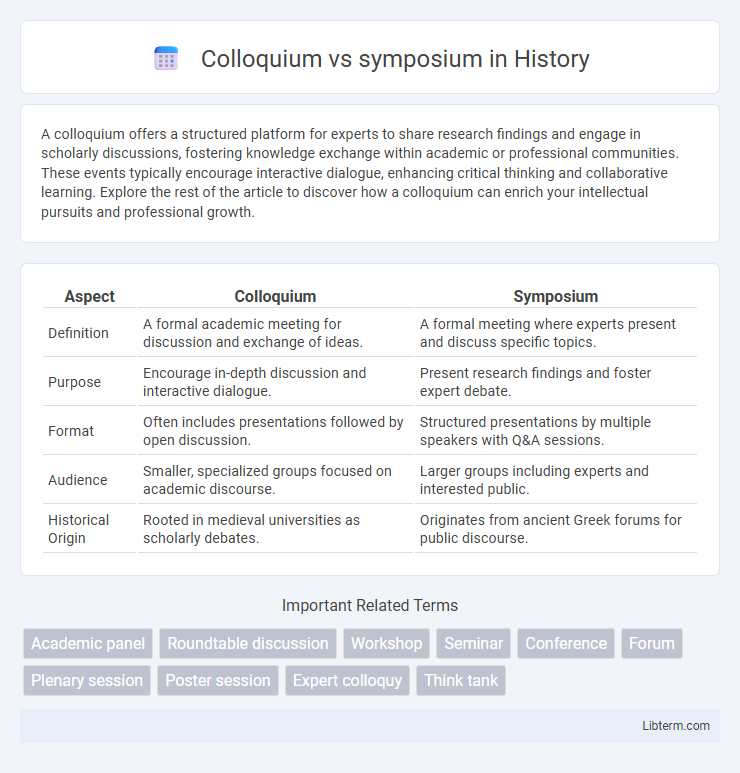A colloquium offers a structured platform for experts to share research findings and engage in scholarly discussions, fostering knowledge exchange within academic or professional communities. These events typically encourage interactive dialogue, enhancing critical thinking and collaborative learning. Explore the rest of the article to discover how a colloquium can enrich your intellectual pursuits and professional growth.
Table of Comparison
| Aspect | Colloquium | Symposium |
|---|---|---|
| Definition | A formal academic meeting for discussion and exchange of ideas. | A formal meeting where experts present and discuss specific topics. |
| Purpose | Encourage in-depth discussion and interactive dialogue. | Present research findings and foster expert debate. |
| Format | Often includes presentations followed by open discussion. | Structured presentations by multiple speakers with Q&A sessions. |
| Audience | Smaller, specialized groups focused on academic discourse. | Larger groups including experts and interested public. |
| Historical Origin | Rooted in medieval universities as scholarly debates. | Originates from ancient Greek forums for public discourse. |
Introduction: Defining Colloquium and Symposium
A colloquium is an academic meeting or seminar focused on exchanging ideas and research among experts within a specific field, often featuring presentations followed by discussions. A symposium is a formal gathering centered on a particular topic where multiple speakers present their findings or viewpoints to an audience, typically emphasizing structured debate and knowledge dissemination. Both events facilitate scholarly communication, but a colloquium tends to be more interactive and less formal than a symposium.
Historical Origins of Colloquium and Symposium
The historical origins of the colloquium trace back to ancient Rome, where it referred to informal gatherings or conversations aimed at sharing ideas, often held in private settings. In contrast, the symposium originates from Ancient Greece as a formal social event combining intellectual discussion with conviviality, typically involving wine drinking and philosophical debates. Both formats have evolved into modern academic conventions, yet the colloquium retains its focus on specialized scholarly interaction, while the symposium emphasizes broader interdisciplinary dialogue.
Key Differences Between Colloquium and Symposium
Colloquium and symposium are both academic gatherings but differ primarily in size, scope, and format. A colloquium typically involves a smaller group of experts focusing on a single specialized topic with interactive discussions, while a symposium encompasses multiple presentations on related themes and accommodates a larger audience. Colloquia emphasize deep, detailed exploration and participant engagement whereas symposiums prioritize broad exposure to varied research findings.
Typical Formats and Structures
A colloquium typically features a single speaker or a small group presenting research followed by audience questions, often held in an academic or professional setting with informal discussion. In contrast, a symposium consists of multiple presentations by different experts on a specific theme, structured with scheduled speeches and panel discussions aimed at deeper exploration of the topic. The symposium format emphasizes diverse viewpoints and interactive dialogue, while colloquia prioritize focused presentations and open-ended scholarly exchange.
Objectives and Purpose
A colloquium primarily aims to facilitate in-depth discussions and knowledge exchange among experts or scholars on specialized topics, encouraging interactive dialogue and critical analysis. A symposium focuses on presenting research findings and expert opinions to a broader audience, often structured with formal presentations followed by limited Q&A sessions. Both formats seek to advance understanding within a field but differ in emphasis on interaction versus dissemination.
Types of Participants Involved
Colloquiums typically involve a smaller, more specialized group of scholars or experts gathered for in-depth discussion and exchange of ideas on a specific topic. Symposiums attract a broader range of participants, including researchers, professionals, and sometimes policymakers, aiming to present and debate diverse perspectives within a field. The participant composition in colloquiums tends to be more intimate and focused, while symposiums facilitate a wider interdisciplinary engagement.
Common Topics and Themes
Colloquiums and symposiums commonly address specialized topics within academic, scientific, or professional fields, such as recent research developments, theoretical frameworks, and practical applications. Both formats emphasize knowledge sharing and critical discussion on subjects like technology advancements, healthcare innovations, and social sciences. These events foster intellectual engagement through presentations, panel discussions, and question-and-answer sessions around shared thematic interests.
Benefits of Attending Each
Attending a colloquium offers direct engagement with experts through interactive discussions and smaller audience sizes, fostering in-depth understanding and networking opportunities within specialized academic fields. Symposiums provide exposure to diverse perspectives by featuring multiple speakers on related topics, enhancing interdisciplinary knowledge and broadening professional connections. Both formats support professional development, but colloquia emphasize focused dialogue, while symposiums highlight comprehensive topic exploration.
Choosing Between a Colloquium and a Symposium
Choosing between a colloquium and a symposium depends on the event's format and audience engagement goals. A colloquium typically features a single expert presentation followed by discussion, ideal for in-depth exploration of a specific topic within academic or professional circles. In contrast, a symposium consists of multiple presentations from various speakers on related subjects, fostering broader perspectives and networking opportunities among participants.
Conclusion: Which Suits Your Needs?
Choosing between a colloquium and a symposium depends on the desired format and audience engagement; colloquia typically offer informal, interactive discussions suited for in-depth exploration among experts, while symposiums present structured sessions with multiple speakers targeting a broader audience. Evaluate your goals regarding participant interaction, topic complexity, and presentation style to select the most effective platform. Understanding these distinctions ensures an event aligned with your objectives and maximizes knowledge exchange.
Colloquium Infographic

 libterm.com
libterm.com